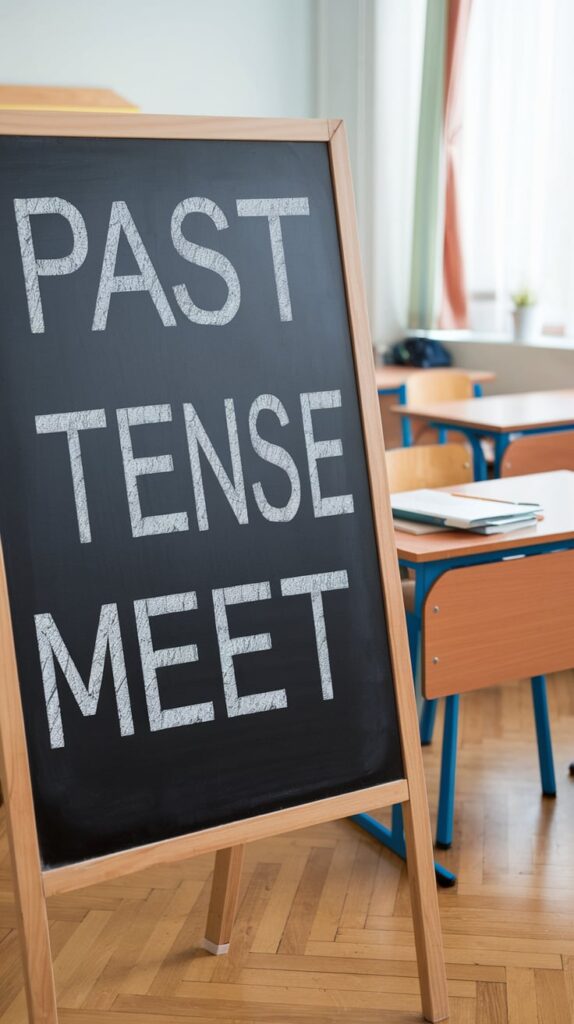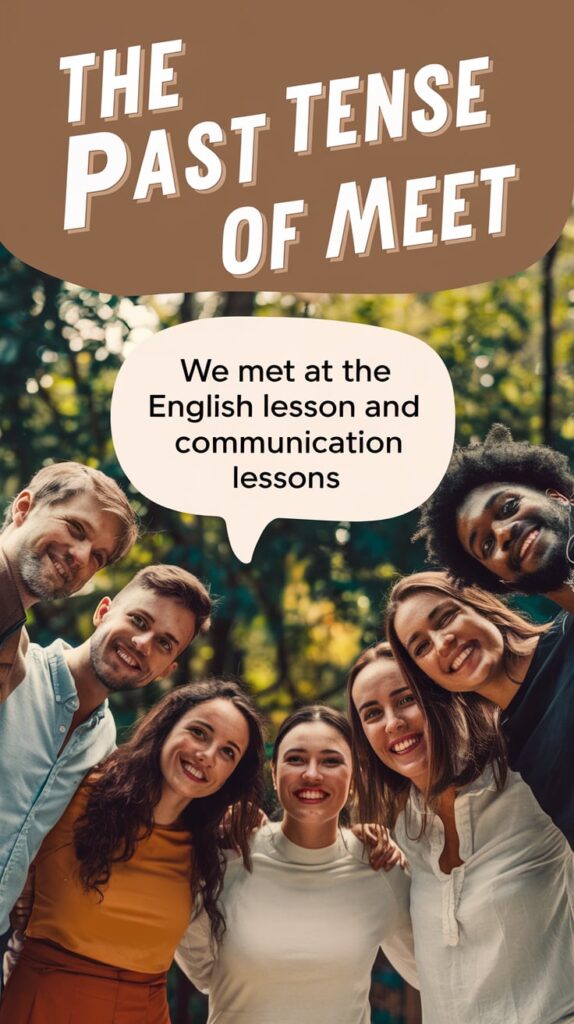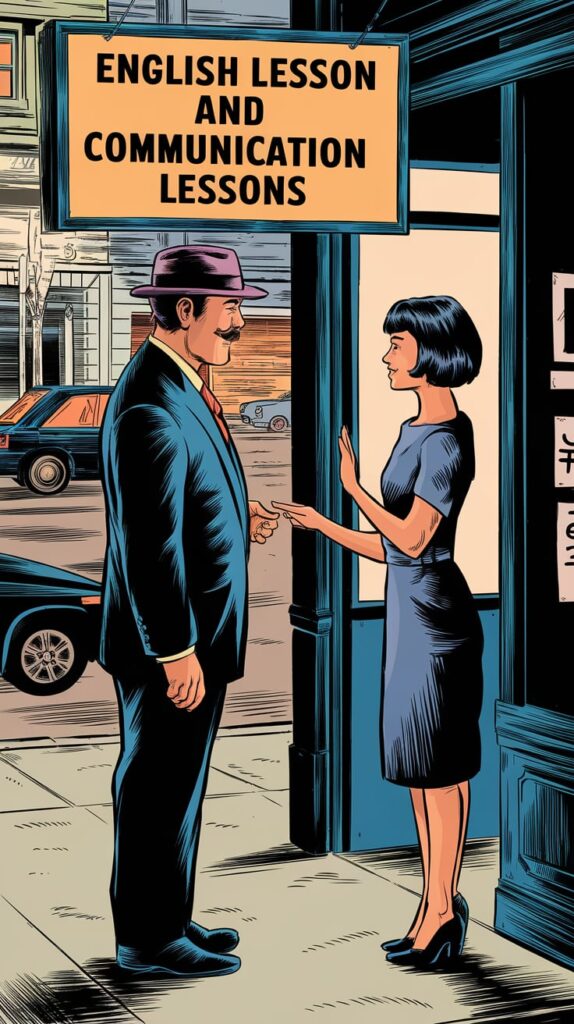Ever found yourself stumbling over the past tense of meet, You’re not alone. One common confusion arises with the verb “meet” – when do you use “met,” and how do you handle all those tricky tenses?
Let’s dive into everything you need to know about the past tense of meet, from basic usage to advanced applications.
What does the Word “Meet” Mean
At its core, “meet” means to come face-to-face with someone or something. It’s a versatile verb we use daily, whether we’re connecting with friends, encountering new situations,

or even when two roads intersect. The beauty of “meet” lies in its simplicity – it’s short, sweet, and gets right to the point.
read more : Other Ways to Say Have a Nice Evening – Grammar Beacon
The Origin of the Word “Meet”
The story of “meet” takes us back to Old English, where “mētan” meant to find or come upon. It’s related to Old Norse “mœta” and has Germanic roots.
Over centuries, its meaning evolved, but the essence remained: bringing things together. The word has shown remarkable resilience, maintaining its core meaning while adapting to countless contexts across generations.
read more : Excel or Accel – Grammar Beacon
How to Pronounce the Past Tense of “Meet” i.e “Met”
Let’s tackle pronunciation. “Met” is a monosyllabic word pronounced as /mɛt/. It starts with an ‘m’ sound, followed by the short ‘e’ vowel sound, and ends with a voiceless dental plosive ‘t’.
It’s quick, crisp, and impossible to misunderstand – exactly what you want in effective communication!
Regional Variations in Pronunciation
While the standard pronunciation remains consistent, some regional accents might slightly alter how “met” sounds:
- In some British dialects, it might sound more like “me’h”
- Australian English might stretch the ‘e’ sound slightly
- In American English, the ‘t’ is often more pronounced
The Simple Verb Tense Table
Here’s a comprehensive look at how “meet” changes across tenses:
| Tense | Affirmative | Negative | Interrogative |
| Present Simple | I meet | I don’t meet | Do I meet? |
| Present Continuous | I am meeting | I’m not meeting | Am I meeting? |
| Present Perfect | I have met | I haven’t met | Have I met? |
| Present Perfect Continuous | I have been meeting | I haven’t been meeting | Have I been meeting? |
| Past Simple | I met | I didn’t meet | Did I meet? |
| Past Continuous | I was meeting | I wasn’t meeting | Was I meeting? |
| Past Perfect | I had met | I hadn’t met | Had I met? |
| Past Perfect Continuous | I had been meeting | I hadn’t been meeting | Had I been meeting? |
| Future Simple | I will meet | I won’t meet | Will I meet? |
| Future Continuous | I will be meeting | I won’t be meeting | Will I be meeting? |
| Future Perfect | I will have met | I won’t have met | Will I have met? |
| Future Perfect Continuous | I will have been meeting | I won’t have been meeting | Will I have been meeting? |
Usage of “Meet” and “Met” in Everyday Conversations
Using “Meet” in Present Tense:
The present tense of “meet” comes in handy when talking about:
- Regular activities: “I meet my study group every Thursday.”
- General truths: “Oil and water don’t meet.”
- Future arrangements: “We meet the clients next week.”
- Habits: “She meets her grandmother for tea every Sunday.”
- Scientific facts: “These rivers meet at the delta.”
Using “Met” in Past Tense:
The past tense “met” is perfect for:
- Completed actions: “I met your sister yesterday.”
- Past experiences: “We met during college.”
- Reporting past events: “The committee met last Friday to discuss the proposal.”
- Historical events: “The Allied leaders met in Yalta in 1945.”
- Personal anecdotes: “I met my best friend in an unexpected way.”
Advanced Applications of “Meet” and “Met”
Idiomatic Expressions
“To meet halfway” – To compromise
“Let’s meet halfway on this issue.”
“To meet one’s match” – To encounter someone equally skilled
“The champion finally met his match in the finals.”
“To meet one’s maker” – To die (often used humorously)
“If I don’t finish this project, I might meet my maker!”
“To meet up” – To gather or assemble
“Let’s meet up for coffee next week.”

Professional Context
In the business world, “meet” and “met” play crucial roles:
Meeting Deadlines
“We met all our quarterly targets.”
“Have you met the submission deadline?”
Meeting Requirements
“The new design meets all safety standards.”
“Our product has met consumer expectations.”
Meeting Expenses
“The company will meet all travel expenses.”
“We’ve met our budget constraints.”
Common Challenges and Solutions
Challenge 1: Mixing Up Tenses
Problem: Inconsistent use of tenses in a sentence
- Incorrect: “When I met him tomorrow, I will tell him.”
- Correct: “When I meet him tomorrow, I will tell him.”
Challenge 2: Passive Voice Confusion
Problem: Uncertainty about passive constructions
- Incorrect: “The requirements were met by me.”
- Better: “I met the requirements.”
Challenge 3: Conditional Sentences
Problem: Incorrect use in hypothetical situations
- Incorrect: “If I will meet him, I would tell him.”
- Correct: “If I met him, I would tell him.”
The Evolution of Meetings
Historical Perspective
Ancient Times
Meetings were often ceremonial or governmental
The Greek Agora was a meeting place for democracy
Middle Ages
Guild meetings shaped commerce
Royal courts met to make laws
Industrial Revolution
Business meetings became formalized
The conference room emerged as a concept

Modern Meetings
Digital Transformation
Virtual meetings have become the norm
AI-powered meeting assistants
Hybrid meeting models
Meeting Efficiency
Time-boxing techniques
Stand-up meetings
Asynchronous meetings
read more : Requester or Requestor Spelling – Grammar Beacon
Psychological Aspects of Meeting People
The Science Behind First Meetings
Neurological Response
The brain processes new faces in 0.1 seconds
Oxytocin release during positive meetings
Psychological Impact
First impressions last up to 6 months
Meeting new people can boost creativity
Social Anxiety and Meetings
Common Concerns
Fear of judgment
Performance anxiety
Coping Strategies
Preparation techniques
Mindfulness approaches
read more : What’s the Plural of Software? Is it Software or Softwares? – Grammar
Cultural Variations in Meeting Customs
Eastern Cultures
Japan
Bowing when meeting
Business card exchange ritual
India
“Namaste” greeting
Respect for elders in meetings
Western Cultures
United States
Firm handshake
Direct eye contact
read more : Pre vs Post: Which Prefix to Use? – Grammar Beacon
Kisses on the cheek
Animated greetings
The Future of Meeting
Technological Advancements
Virtual Reality Meetings
Immersive 3D environments
Haptic feedback for “virtual handshakes”
Augmented Reality
Holographic presentations
Real-time translation in meetings
Evolving Social Norms
Post-Pandemic Changes
Hybrid meeting etiquette
New greeting customs
Environmental Considerations
Carbon-neutral meeting options
Sustainable meeting practices
Educational Applications
Teaching “Meet” and “Met”
ESL Strategies
Role-playing exercises
Contextual learning activities
Common Mistakes
Overuse of present tense
Confusion with similar verbs
Testing Knowledge
Assessment Techniques
Gap-fill exercises
Scenario-based questions
Self-Study Tips
Journaling past meetings
Practice with tongue twisters
Literary Usage
Famous Quotes with “Meet” and “Met”
- “Never the twain shall meet” – Rudyard Kipling
- “We met at midnight” – Shakespeare, “A Midsummer Night’s Dream”
Metaphorical Uses
In Poetry
“Where sky meets sea”
“When day meets night”
In Prose
Describing confluences
Metaphors for destiny

Sources
- Oxford English Dictionary
- Cambridge Dictionary
- Merriam-Webster Dictionary
- Etymology Online
- Academic linguistic research papers
- Cultural anthropology studies
- Business communication handbooks
Key Takeaways
- “Meet” is an irregular verb – its past tense is “met”
- The pronunciation is straightforward: /mɛt/
- Context determines which tense to use
- Various synonyms exist for different situations
- Understanding proper usage enhances communication
- Cultural awareness affects meeting customs
- Technology is transforming how we meet
Practical Exercises
Fill in the Blanks
- Yesterday, I _ (meet) my old friend.
- We usually _ (meet) on Thursdays.
Sentence Transformation
- Change: “I meet him daily” to past tense
- Convert: “They had met before” to present perfect
Remember, mastering the past tense of “meet” isn’t just about grammar – it’s about effective communication. Whether you’re writing an email, telling a story, or giving a presentation, using the right verb tense makes your message clear and professional.
So next time you need to talk about a meeting that’s already happened, you’ll know exactly what to say!
The Impact of “Meet” in Daily Life
From business meetings to chance encounters, the concept of meeting shapes our daily experiences. By understanding the nuances of using “meet” and “met,” we can:
- Communicate more effectively
- Build stronger relationships
- Navigate social and professional situations
- Share our experiences accurately
- Appreciate the rich tapestry of human connections
Whether you’re a student, professional, or language enthusiast, mastering the usage of “meet” in all its tenses will serve you well in countless situations throughout life.

James Logan is a seasoned blogger and language enthusiast behind Grammar Beacon. With years of experience in grammar and writing, James shares his expertise through insightful and engaging content. His passion for clear communication and linguistic precision shines in every post, making complex grammar concepts accessible and enjoyable for readers. Follow James for expert advice and tips to refine your writing skills.







